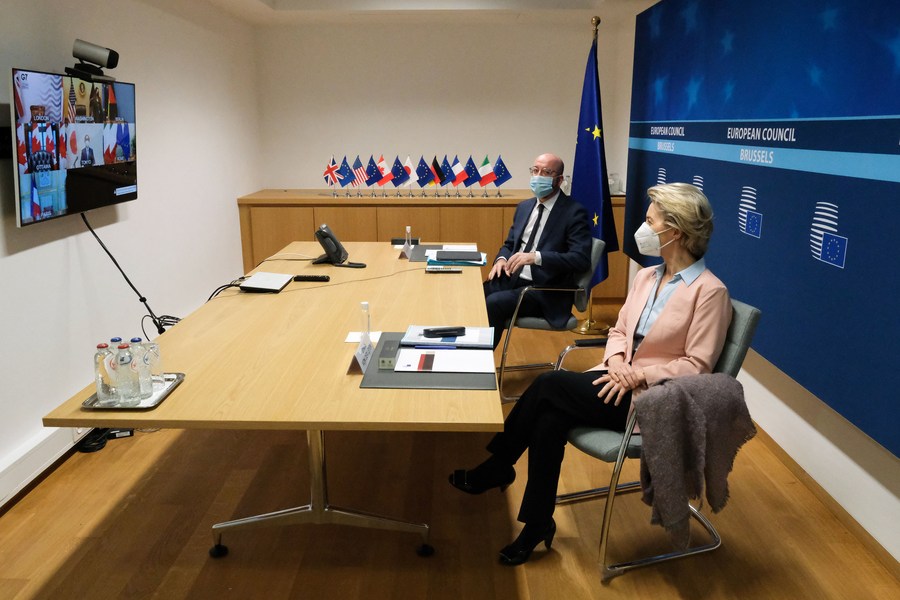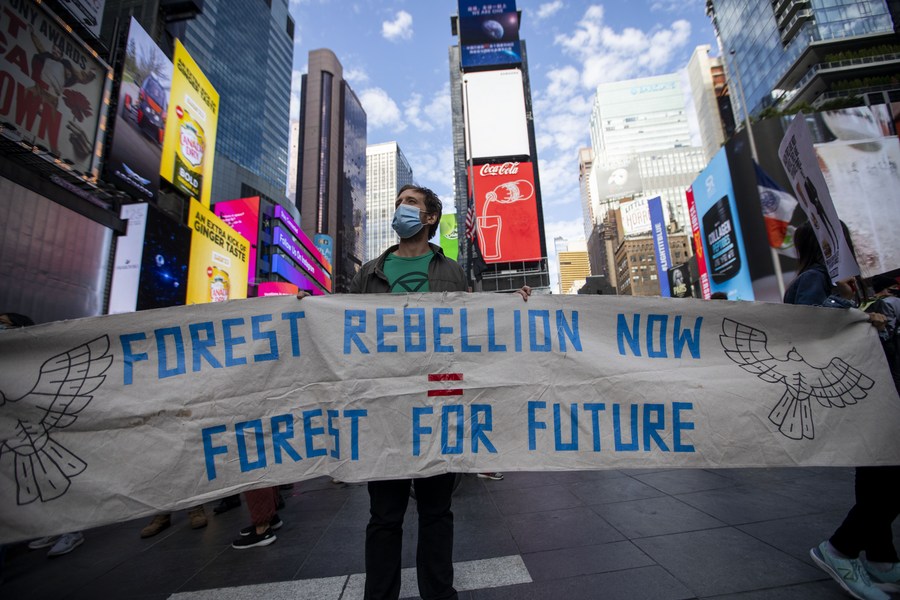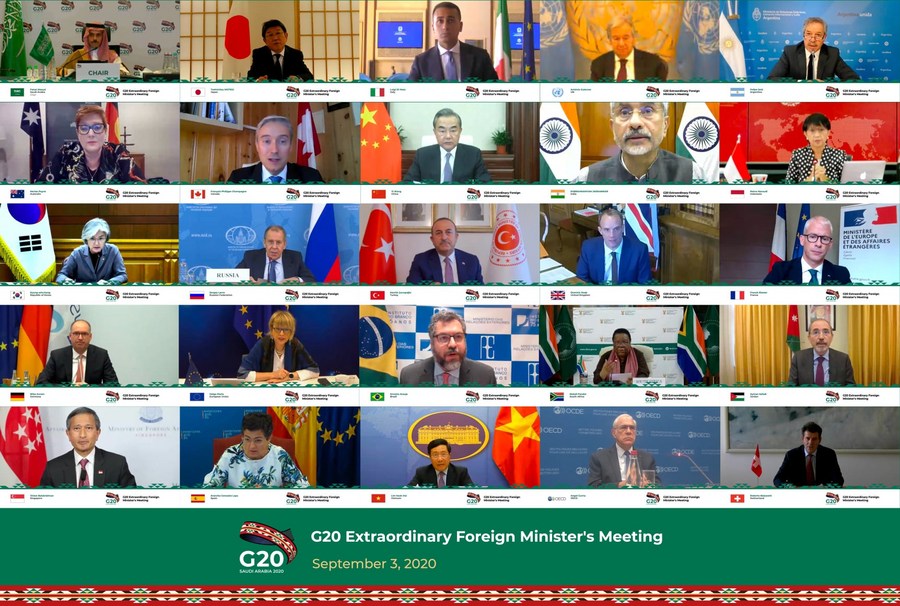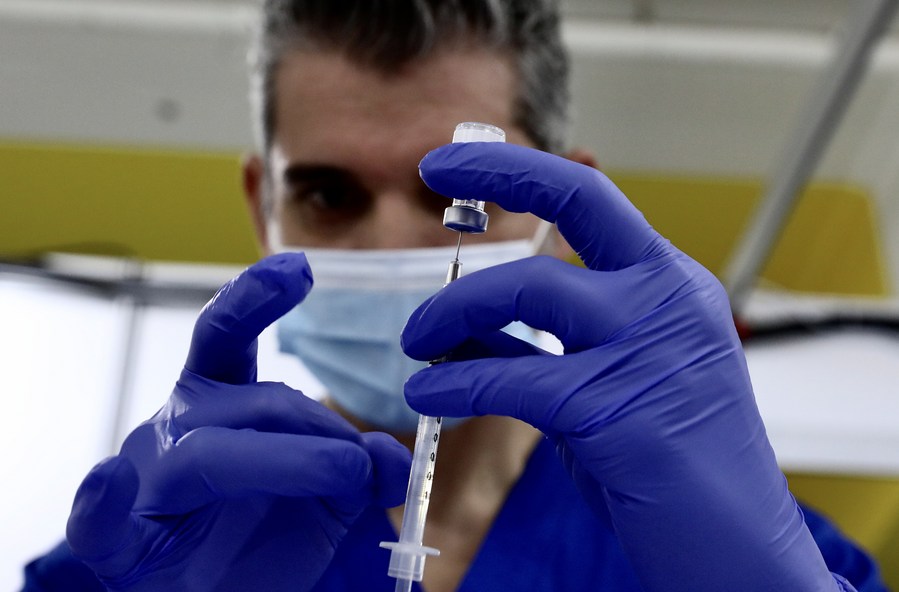
British Prime Minister Boris Johnson attends a virtual meeting of the leaders of the Group of Seven at Downing Street in London, Britain, on Feb. 19, 2021. (Andrew Parsons/No 10 Downing Street/Handout via Xinhua)
It signaled that the group will be recommitted to multilateral cooperation but its pledges, especially the commitment to equal vaccine distribution, still need to be tested, observers say.
LONDON, Feb. 20 (Xinhua) -- Leaders of the Group of Seven (G7) pledged on Friday to cooperate with the Group of 20 (G20) and other institutions on a range of global issues including fighting COVID-19 and climate change.
"We will work together and with others to make 2021 a turning point for multilateralism," said a joint statement released after the virtual meeting of G7 leaders chaired by British Prime Minister Boris Johnson.
It signaled that the group will be recommitted to multilateral cooperation but its pledges, especially the commitment to equal vaccine distribution, still need to be tested, observers say.

European Council President Charles Michel (L) and European Commission President Ursula von der Leyen are seen for a virtual meeting of the leaders of the Group of Seven in Brussels, Belgium, on Feb. 19, 2021. (European Union/Handout via Xinhua)
MULTILATERALISM
In the joint statement, the G7 leaders affirmed their support for the "leading and coordinating role" of the World Health Organization (WHO) while accelerating global vaccine development and deployment to fight COVID-19.
On the economic recovery, the G7 leaders voiced their support for the most vulnerable countries, their commitment to the Sustainable Development Goals and their partnership with Africa.
The leaders also pledged further efforts to curb the impact of climate change ahead of the UN Climate Change Conference (COP26) in Glasgow, Scotland, in November and the 15th meeting of the Conference of the Parties to the Convention on Biological Diversity (COP15) in Kunming, China, in May. They vowed to act in accordance with the Paris Agreement and reaffirmed "a path to net zero (emissions) no later than 2050."

A man takes part in a climate change protest in Times Square in New York, the United States, on Sept. 20, 2020. (Xinhua/Wang Ying)
The leaders said that they will be committed to upholding open economies and cooperating within a freer and fairer rules-based multilateral trading system.
John Vogler, a professor of international relations at Keele University, told Xinhua that the G7 meeting is "quite significant" as countries across the Atlantic are keen to bridge the internal divisions left from former U.S. President Donald Trump.
Meanwhile, it is clear that the G7 itself is inadequate to tackle such pressing global challenges as the coronavirus pandemic, climate change and economic recovery.
ENGAGING WITH G20
Cooperation with the G20 was mentioned multiple times in the G7 joint statement.
According to Vogler, the concept of the G7 "is beginning to look a little bit dated" under the current global context. The fact that the G7 would reach out to work with the G20 shows it realizes that a broader sense of global unity is needed to tackle global challenges.
"It (G7) represents the big economic powers of the 1970s and 80s. And there's been huge structural change since then. So arguably, the body that's important now and certainly since 2008 ... is another of these G bodies, the G20," Vogler told Xinhua.

Photo taken on Sept. 3, 2020 in Riyadh, Saudi Arabia shows G20 foreign ministers attending the virtual G20 Extraordinary Foreign Minister's Meeting. (G20 Saudi Arabia/Handout via Xinhua)
The G20 represents a more significant multilateral platform because it includes major economies like China and India, Vogler said.
"If I was thinking in terms of steering the global economy after the pandemic, and indeed, of talking about climate change, you can't avoid having China in the room," he added.
Echoing Vogler, Astrid Nordin, founding director of Lancaster University China Center, said she believes that now is not the time for confrontation.
"Frank and open discussions," "not just ideological conjecture," are much needed from all sides to enable cooperation in various areas, she said.
COMMITMENT TO BE TESTED
Among the top priorities of the G7 virtual meeting is the fair distribution of coronavirus vaccines across the globe. There have been some positive steps to ensure equitable global access to vaccines.
Johnson, in his speech at the G7 meeting, pledged to donate most of Britain's surplus vaccine supply to developing countries.
The United States said last month it would join the COVAX, an international initiative for COVID-19 vaccines led by the WHO, becoming the last G7 country to do so.

Photo taken on Jan. 18, 2021 shows doses of COVID-19 vaccines at a temporary vaccination centre on the first day of its opening, in Clichy, France. (Xinhua/Gao Jing)
French President Emmanuel Macron has also called on Europe and the United States to send up to 5 percent of their coronavirus vaccine supplies to developing nations.
Britain has ordered more than 400 million doses of coronavirus vaccines, much more than enough for a country with a population of about 66 million.
However, it remains unclear when and how much of the surplus will be donated to developing countries as the government takes into consideration the vaccine supply chain and whether booster shots are needed in the autumn.
The U.S.-based anti-poverty non-profit group, the ONE campaign, said countries like Britain are not doing enough.
"Sharing surplus doses through COVAX is the right thing to do, but there is a real risk of double standards if we talk a good game on global vaccines access but continue to stockpile more doses than we need," said the organization's Britain director Romilly Greenhill.

A health care worker prepares a dose of COVID-19 vaccine at a new vaccination site in the California Polytechnic State University in Pomona, Los Angeles County, California, the United States, Feb. 5, 2021. (Xinhua)
Figures from the ONE campaign showed that Australia, Canada, Japan, Britain, the United States and the European Union have secured more than 3 billion doses of coronavirus vaccines, a number much higher than they need to give their entire population two doses.
UN Secretary-General Antonio Guterres has warned of the "widely uneven and unfair" distribution of coronavirus vaccines, saying that some 130 countries have not yet received a single dose of vaccine.
Facing the common foes of humanity, it is imperative to "imagine humanity as a unit," instead of remaining divisive and confrontational, Nordin said. ■




